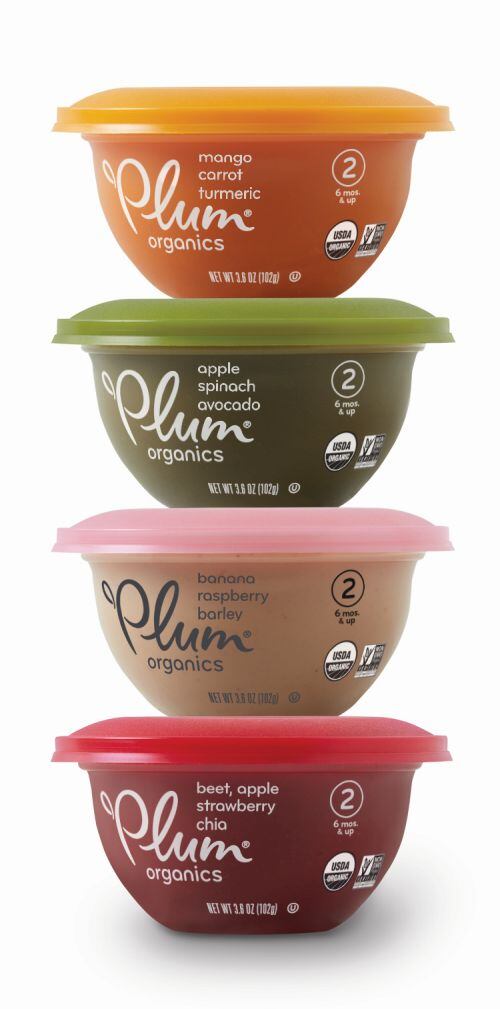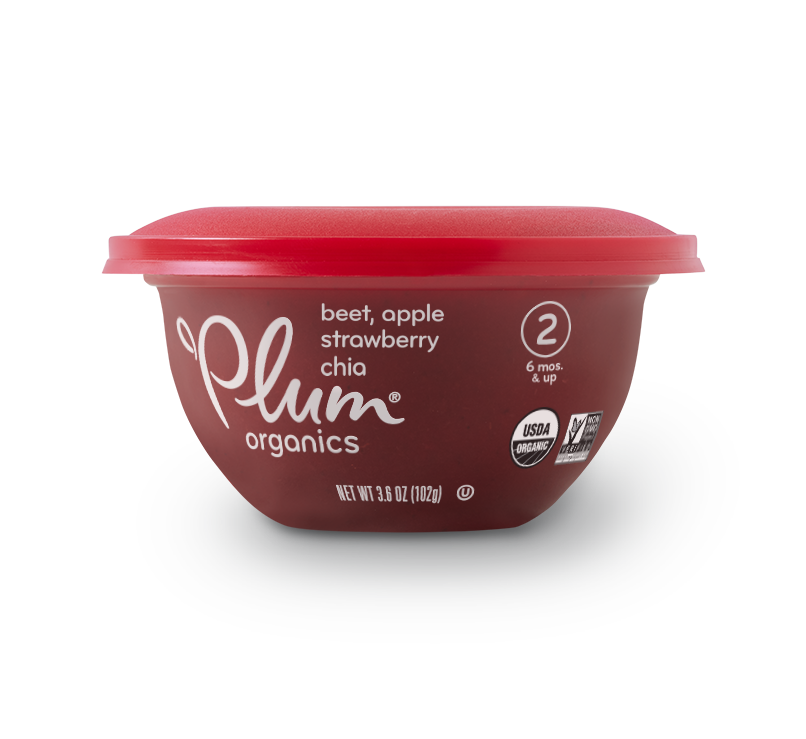The lightweight, stackable, re-sealable bowls - developed in collaboration with IDEO – feature a built-in spoon rest and on-pack freshness marker, while the recipes include on-trend ingredients including avocado, turmeric, papaya, cauliflower and chia, SVP innovation and marketing, Ben Mand, told FoodNavigator-USA.
So who’s going to buy the bowls, and will they cannibalize sales of Plum’s signature pouches?
While there is “always some overlap” when you launch a new product in the same category, said Mand, Plum is anticipating that the bulk of the sales generated by the new bowls will be incremental to Plum, with growth coming from parents currently buying glass jars, or new entrants to the category.
“We do feel that in the baby aisle, the jar and bowl segment is sleepy and uninspired, so I think the Baby Bowls will bring some new parents into the fold, because of the types of ingredients and the design, but I also think it will be incremental to Plum as there’s a different occasion for pouches and bowls, so this is more for that at-home occasion vs on the go, and also for a younger baby.”
The jar segment is a little sleepy
Retailers, meanwhile, are typically making space for the new bowls – rolling out to chains including Target, Albertsons, Wegmans, HEB, Kroger and Amazon this fall – by cutting space devoted to slower selling jars, he said.
“Retailers say a lot of their jar items are not so productive, so they see there is an opportunity to create a space for us by weeding out some of the slower sellers. They see the jar segment as a little sleepy, and the fact that this is better from an environmental footprint standpoint than glass jars also resonates, along with the more culinary-inspired recipes that you see in pouches but not necessarily in jars at the moment.”

The retail price for the bowls will likely be $1.19-1.49 depending on the retailer, he said.
Human centered design
While Gerber launched cube-shaped plastic containers in the early 2000s, Plum’s shelf-stable baby bowls (filled via a hot fill process with a shelf life of around 10 months) are designed to sit in the palm of the hand, said Mand.
“The pouches facilitated on-the-go consumption, but when you think about those first solid foods, they are often eaten at home with a spoon at the table or in a high chair.
“We are big believers in human centered design, so we spent a lot of time just watching parents feeding their children and leveraged them from a co-creation standpoint. How do they hold the jar or tub, where do they put the spoon down, and so on, and we felt there had not been a ton of innovation and thoughtful design in that at-home spoon occasion, so we spent a lot of time experimenting with different designs.
“We also included an on-pack freshness marker in part because parents are often very sleep-deprived: When did I open that jar? Was it yesterday, was it today, was it two hours ago?”
Is a move into refrigerated baby food on the cards?
So what’s happening in the broader baby food category, and where does Plum fit in?
Overall, the babyfood category is still growing, with organic brands driving that, said Mand, who noted a lot of new players had also entered the category over the past couple of years, although not all of them were still around. Plum – which was acquired by Campbell Soup in 2013 – does not share growth or revenue figures, but Mand said he felt “pretty good about our growth.”
Online sales, meanwhile, now represent “a very significant and growing part of the business,” he added.
But what does Mand make of the refrigerated baby food segment, and is Plum Organics contemplating using high pressure processing (HPP) or other technologies to enter this market?
“We always start from a standpoint of what does ‘home made’ look like and what’s the best model for delivering something as close to that as possible?” he said. “So we’re looking at all of the options, whether it’s HPP or fresh delivery or something else.
“There’s a number of these small [HPP] brands looking at bricks and mortar or direct delivery [to consumers’ homes] and we do believe that there is an opportunity to have a number of different offerings to meet a lot of different needs, so we think there is room for lots of players in this market.”

Each shelf-stable Baby Bowl has an SRP of $1.29 and comes in one of 10 flavors: Apple, Spinach & Avocado; Banana, Raspberry & Barley; Beet, Apple, Strawberry & Chia; Mango & Quinoa; Pumpkin, Banana Papaya & Cardamom; Apple, Blackberry & Oat; Mango, Carrot & Turmeric; Pear & Prune; Pear, Cauliflower, Cherry & Raisin; and Pear, Sweet Potato & Red Bell Pepper.
